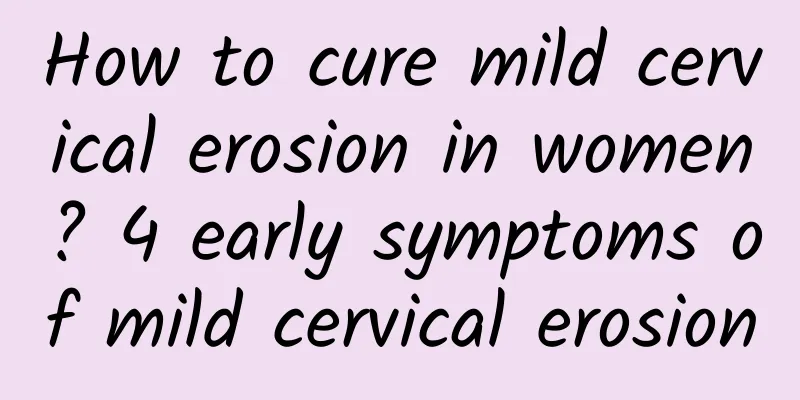The dangers of medical abortion

|
Medical abortion can be said to be the most convenient and quickest method of active abortion. It is generally suitable for women who are in a relatively short period of pregnancy and want to terminate the pregnancy. Although medical abortion has less trauma, it also has many dangers. If it is not performed properly, it is very likely to cause habitual abortion, which will make people regret it. Below, the editor will list for you the dangers of medical abortion. Dangers of medical abortion: 1. Bacterial infection: After medical abortion, the embryonic sac tissue in the uterine cavity is mostly discharged on the same day. Some patients may encounter incomplete discharge of pregnancy tissue and poor restoration of the uterine membrane, which will lead to longer vaginal bleeding. Long-term irregular bleeding after medical abortion can cause chronic anemia, reduce the body's resistance, and easily cause bacterial infection. 2. Cause heavy bleeding: The disadvantage of medical abortion is that it can easily lead to incomplete abortion. The residual fetal membrane tissue can cause hemorrhage and heavy bleeding. In this case, you must be admitted to the hospital immediately for curettage and cleaning. If you are not rescued in time, your life will be in danger. 3. Inducing habitual abortion: Since medical abortion is less thorough, incomplete abortion may require another abortion operation, which will cause repeated damage to the endometrium, making placenta previa more likely to occur, causing heavy prenatal bleeding or habitual abortion. 4. Symptoms causing dysmenorrhea: Some women will experience dysmenorrhea or aggravated symptoms after medical abortion, with crampy or persistent pain in the lower abdomen during menstruation, accompanied by nausea, vomiting, back pain, breast swelling, and even fainting in severe cases. 5. Menstrual disorders: Anti-pregnancy drugs can affect the growth and development of follicles and even interfere with ovulation. Some women may experience menstrual disorders after medical abortion, which are manifested as shortened or prolonged menstrual cycles and increased menstrual duration. 6. Affecting fertility and causing infertility: Medical abortion can easily lead to blockage of the fallopian tubes and cervical adhesions, causing infertility; Medical abortion can cause excessive damage to the uterus and ovaries, which is also one of the causes of infertility. The above is an introduction to the hazards of medical abortion. In short, the physical and psychological harm caused by abortion to women is very great. Every year, thousands of women become disabled or even die due to abortion. |
<<: How to carry out daily care after childbirth
>>: Professional knowledge related to abortion care
Recommend
The main causes of pelvic inflammatory disease
Pelvic inflammatory disease is one of the more co...
What should women do if they have irregular menstruation during menopause? Is it normal for women to have menstruation every 2-3 months during menopause?
What are the differences between the symptoms of ...
How many eggs can a normal person eat in a day? Is it okay to eat more eggs every day? Aren’t you worried about your cholesterol going off the charts?
How many eggs can a normal person eat in a day? I...
What is the reason for repeated small amounts of bleeding after abortion?
Repeated small amounts of bleeding after abortion...
During the Mid-Autumn Festival barbecue, how to prevent fat accumulation and obesity? Learn "these 3 tricks" to achieve your ideal body shape
The Mid-Autumn Festival is approaching, and the f...
What are the symptoms of malignant ovarian cysts?
Ovarian cysts are generally benign, but some of t...
How big is the ovarian chocolate cyst and how easy is it to rupture
How likely is an ovarian chocolate cyst to ruptur...
What are the treatments for cervical warts?
For some serious diseases, we should also provide...
Eat delicious cabbage to stay healthy without forgetting dietary taboos
Chinese cabbage Other names: cabbage, Chinese cab...
Can I avoid going to the hospital for vaginitis?
If the vaginitis is mild, it can be relieved thro...
Experts please tell us about the complications of abortion
There are many things that patients who have unde...
What are the classifications of uterine fibroids? Can I still get pregnant after removing uterine fibroids?
Clinically, it is found that many people panic af...
Does premature ovarian failure cause fatty liver?
Premature ovarian failure may cause fatty liver, ...
Boiled eggs are nutritious, but can the elderly only eat boiled eggs? Nutritionist Zhao Hanying reveals: 3 NG ways to cook eggs
Boiled eggs are simple to make and are one of the...
How to treat pelvic effusion with infusion
Many people want to have a drip as soon as they a...









